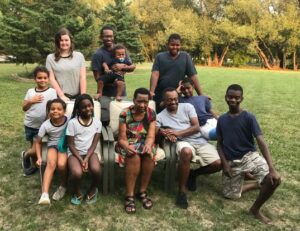Gary Elbers, one of our spokespeople,  believes it’s important to let family members know you’re living with dementia. You may feel hesitant to share the changes and challenges going on in your life with others because you don’t want to give them cause for concern or be viewed any differently in their eyes. But for Gary, telling his family about his wife Brenda’s diagnosis was a way to bring in more support, more love and more understanding for the both of them.
believes it’s important to let family members know you’re living with dementia. You may feel hesitant to share the changes and challenges going on in your life with others because you don’t want to give them cause for concern or be viewed any differently in their eyes. But for Gary, telling his family about his wife Brenda’s diagnosis was a way to bring in more support, more love and more understanding for the both of them.
Below is a letter written by Gary. In it, he opens up to his grandchildren about dementia and the best way to interact with their grandma Brenda. This is just one unique experience of a care partner and person living with dementia.
Letter to the Grandchildren
My Dear Grand Children,
Re: Grandma Brenda
As you know Grandma has Dementia. Dementia is an illness like a cold or an infected wound. Unlike a cold/cough there are no physical signs or sounds, it is not contagious; you cannot get it from a hug or kiss or being close to her. Unlike an infected wound, there are no signs like swelling, soreness or a bandage. It is not hereditary*, it does not pass down through the family, for no one from Grandma’s mother’s or father’s side had Dementia.
However the effect of dementia is widespread as family, friends, and anyone who has to interact with her are baffled. Generally, we cannot predict how someone with dementia will react to anything said, done, or within their environment. Each person affected by dementia could have a different reaction to the same stimulus and within minutes could have a changed response.
So far they have not found a cure as yet. Dementia affects the brain and in grandma’s case, her memory. The ‘memory bank’ is essential to learning and living. It helps us to remember how to do things, what will help or hurt us, good from bad, family from strangers, friends from enemies, what just happened or understand what was said. Well, grandma is losing or has lost some of that. Think of peeling an onion, one layer at a time, and within each layer are some of those essential memories.
I know it’s hard, I know it hurts, I know you are sad, I know you are confused when grandma does not recognize you. I have those same feelings too when she does not recognize me, and I am with her every day. She also gets confused around people. So, what can we do? Well, ask questions, talk about how you feel, what grandma was like before she got sick and, remember the things she did, the fun we had, how she made us feel, and how much she loves you. Although we can’t bring back the past, know that she still loves you, but now only remembers you as a little child. That’s why she tries to talk and play with little children, she thinks it’s you. So be calm and patient, always say grandma when you talk to her, smile, gently touch her, ask to hug her, tell her you love her, and tell her what you have been doing. You can even tell her the same things over and over again. If she looks at you strangely, she is probably trying to figure out who you are. You could give her your name and say, ‘your grandchild all grown up’. She will know from the way you speak, that you love her and care for her.
Take every opportunity to enjoy the moment and time you spend with her. Do things with her and allow her to do as much as she can without becoming frustrated. Make this the best moment, the best day you can have with your grandma and, next time you see her, do it again.
Grandma and I both love you always,
Grandpa Gary.
*Dementia can be either hereditary or non-hereditary. In Gary and Brenda’s case, there is no family history of dementia.
